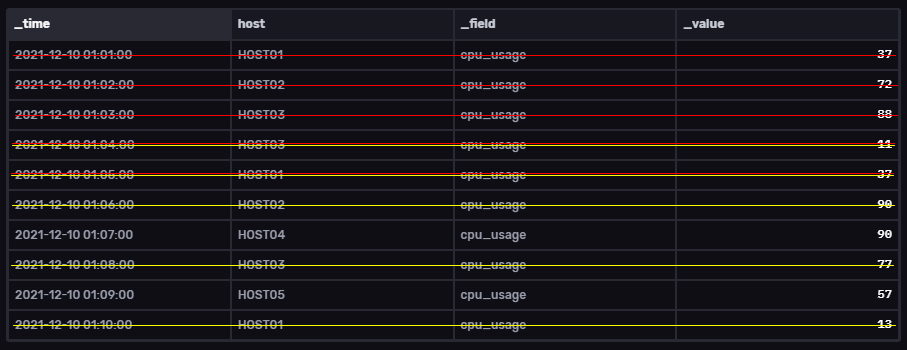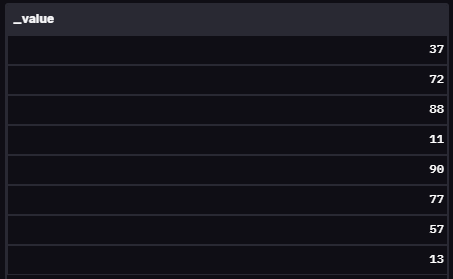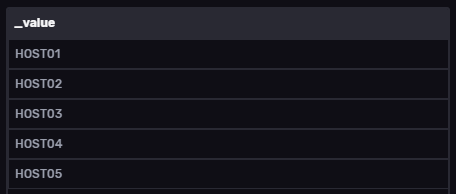InfluxDB: Flux - Distinct() vs. Unique(): Unterschied zwischen den Versionen
Admin (Diskussion | Beiträge) |
Admin (Diskussion | Beiträge) K |
||
| (8 dazwischenliegende Versionen des gleichen Benutzers werden nicht angezeigt) | |||
| Zeile 1: | Zeile 1: | ||
''Because I was confused several times about which function is the right one (distinct() or unique()) I write this site.''<br> | ''Because I was confused several times about which function is the right one (distinct() or unique()) I write this site.''<br> | ||
| − | Long Story Short - The only difference between distinct() and unique(): '''Distinct() removes all other columns then the specified unique() does not do this.''' | + | Long Story Short - The only difference between distinct() and unique(): '''Distinct() removes all other columns then the specified column, unique() does not do this.''' |
| Zeile 67: | Zeile 67: | ||
This means following rows will be removed: <br> | This means following rows will be removed: <br> | ||
[[Datei:01-base-table after distinct with parameter.png]]<br> | [[Datei:01-base-table after distinct with parameter.png]]<br> | ||
| − | |||
| − | |||
| − | |||
| Zeile 76: | Zeile 73: | ||
== Unique() == | == Unique() == | ||
''The unique() function returns '''all records containing unique values in a specified column. Group keys, record columns, and values are not modified'''. Unique() is a selector function.'' <br> | ''The unique() function returns '''all records containing unique values in a specified column. Group keys, record columns, and values are not modified'''. Unique() is a selector function.'' <br> | ||
| + | ''Important to know: If unique() finds multiple times the same value in the specified column, then '''it selects the first/oldest data'''.'' | ||
''The function unique() by default uses the column <code>_value</code>.'' <br> | ''The function unique() by default uses the column <code>_value</code>.'' <br> | ||
| − | ''For example I use | + | ''For example I use unique() mainly for tables that I have to '''deduplicate on a specified column'''.'' <br> |
Function documentation: https://docs.influxdata.com/flux/v0.x/stdlib/universe/unique/ | Function documentation: https://docs.influxdata.com/flux/v0.x/stdlib/universe/unique/ | ||
| Zeile 109: | Zeile 107: | ||
This means following rows will be removed: <br> | This means following rows will be removed: <br> | ||
[[Datei:01-base-table after distinct with parameter.png]]<br> | [[Datei:01-base-table after distinct with parameter.png]]<br> | ||
| + | |||
| + | |||
| + | |||
| + | == Unique() - select the last/newest values == | ||
| + | Because of - ''if unique() finds multiple times the same value in the specified column, then '''it selects the first/oldest data'''.'' - here is an example how to use unique() but select the last/newest values. | ||
| + | |||
| + | You only have to add the '''sort() function before unique()''': | ||
| + | <pre> | ||
| + | .. | ||
| + | array.from(rows: var) | ||
| + | |> sort(columns: ["_time"], desc: true) | ||
| + | |> unique(column: "host") | ||
| + | </pre> | ||
| + | |||
| + | '''Output''' <br> | ||
| + | [[Datei:01-unique with sort.png]] <br> | ||
| + | |||
| + | This means instead of removing the yellow rows, the red rows will be removed: <br> | ||
| + | [[Datei:02-baste-table after unique with sort.png]] <br> | ||
| + | |||
Aktuelle Version vom 10. Dezember 2021, 12:57 Uhr
Because I was confused several times about which function is the right one (distinct() or unique()) I write this site.
Long Story Short - The only difference between distinct() and unique(): Distinct() removes all other columns then the specified column, unique() does not do this.
Inhaltsverzeichnis
[Verbergen]Base Data
All the the examples from this site are based from the following data:
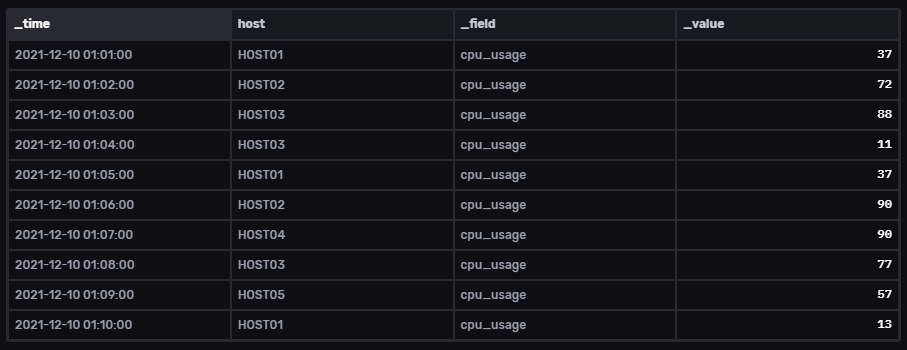
Flux query to generate this data
import "array"
var = [
{_time: time(v: "2021-12-10T00:01:00Z"), host: "HOST01", _field: "cpu_usage", _value: 37},
{_time: time(v: "2021-12-10T00:02:00Z"), host: "HOST02", _field: "cpu_usage", _value: 72},
{_time: time(v: "2021-12-10T00:03:00Z"), host: "HOST03", _field: "cpu_usage", _value: 88},
{_time: time(v: "2021-12-10T00:04:00Z"), host: "HOST03", _field: "cpu_usage", _value: 11},
{_time: time(v: "2021-12-10T00:05:00Z"), host: "HOST01", _field: "cpu_usage", _value: 37},
{_time: time(v: "2021-12-10T00:06:00Z"), host: "HOST02", _field: "cpu_usage", _value: 90},
{_time: time(v: "2021-12-10T00:07:00Z"), host: "HOST04", _field: "cpu_usage", _value: 90},
{_time: time(v: "2021-12-10T00:08:00Z"), host: "HOST03", _field: "cpu_usage", _value: 77},
{_time: time(v: "2021-12-10T00:09:00Z"), host: "HOST05", _field: "cpu_usage", _value: 57},
{_time: time(v: "2021-12-10T00:10:00Z"), host: "HOST01", _field: "cpu_usage", _value: 13}
]
array.from(rows: var)
Distinct()
The distinct() function returns the unique values for a given column. Null is considered its own distinct value if it is present.
The _value of each output record is set to only the specified column. This means all other columns will be removed. Distinct() is a selector function.
The function distinct() by default uses the column _value.
For example I use distinct() mainly for Grafana template variables.
Function documentation: https://docs.influxdata.com/flux/v0.x/stdlib/universe/distinct/
Example 1 - without parameter
So if you use distinct() without parameter like following query:
.. array.from(rows: var) |> distinct()
This means following rows will be removed:
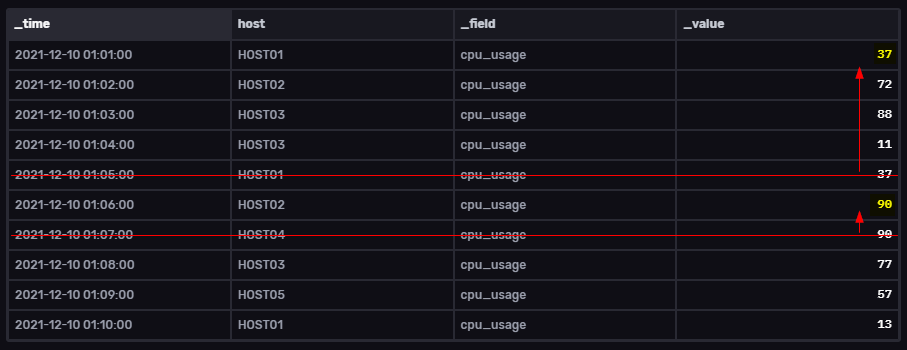
Example 2 - with parameter "host"
So if you use distinct() with parameter like following query:
.. array.from(rows: var) |> distinct(column: "host)
This means following rows will be removed:
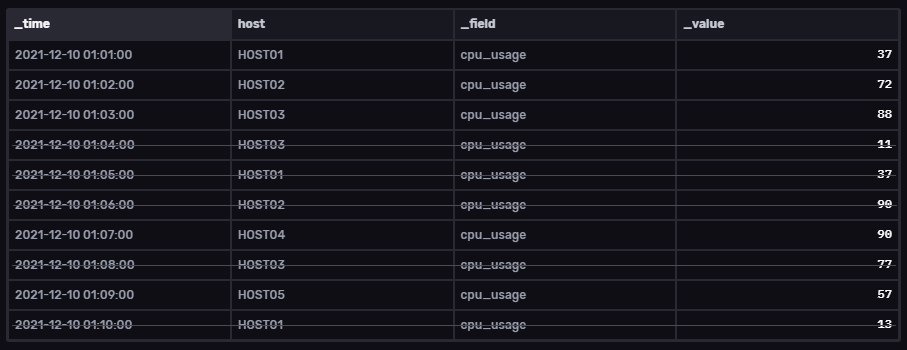
Unique()
The unique() function returns all records containing unique values in a specified column. Group keys, record columns, and values are not modified. Unique() is a selector function.
Important to know: If unique() finds multiple times the same value in the specified column, then it selects the first/oldest data.
The function unique() by default uses the column _value.
For example I use unique() mainly for tables that I have to deduplicate on a specified column.
Function documentation: https://docs.influxdata.com/flux/v0.x/stdlib/universe/unique/
Example 1 - without parameter
So if you use unique() without parameter like following query:
.. array.from(rows: var) |> unique()
This means following rows will be removed:

Example 2 - with parameter "host"
So if you use unique() with parameter like following query:
.. array.from(rows: var) |> unique(column: "host)
This means following rows will be removed:

Unique() - select the last/newest values
Because of - if unique() finds multiple times the same value in the specified column, then it selects the first/oldest data. - here is an example how to use unique() but select the last/newest values.
You only have to add the sort() function before unique():
.. array.from(rows: var) |> sort(columns: ["_time"], desc: true) |> unique(column: "host")
This means instead of removing the yellow rows, the red rows will be removed:
